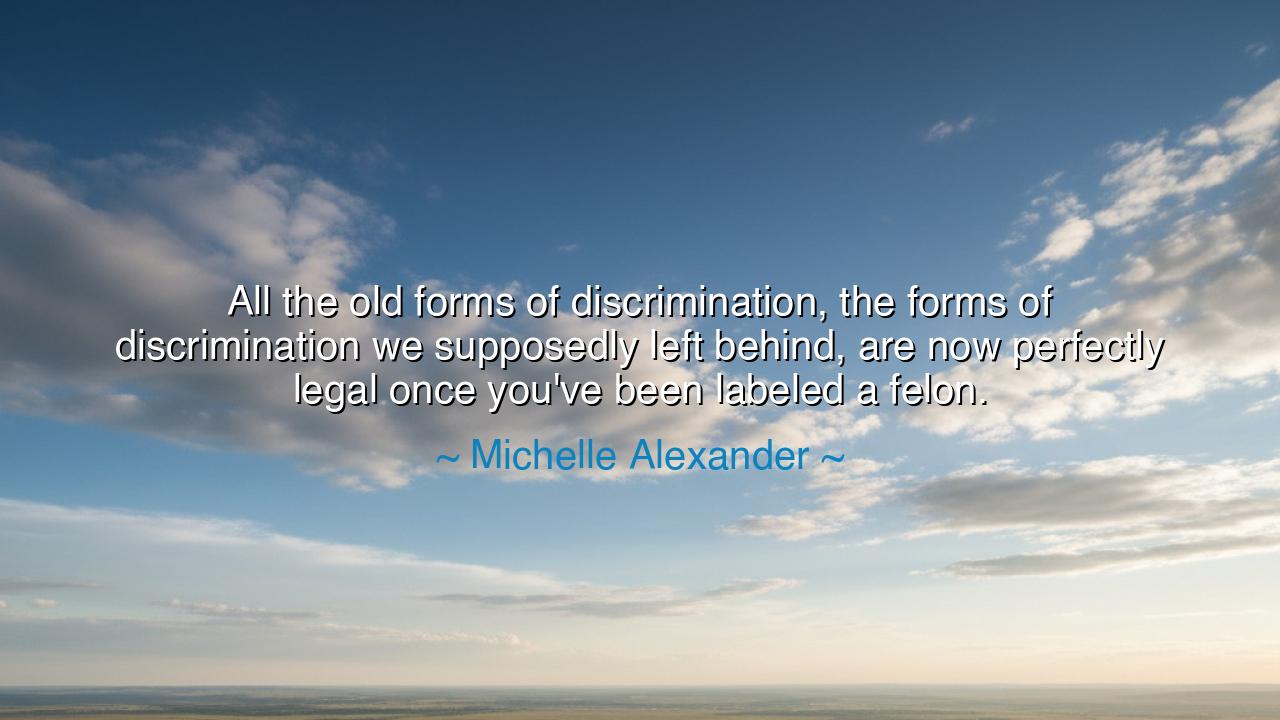
All the old forms of discrimination, the forms of discrimination
All the old forms of discrimination, the forms of discrimination we supposedly left behind, are now perfectly legal once you've been labeled a felon.






When Michelle Alexander declared, “All the old forms of discrimination, the forms of discrimination we supposedly left behind, are now perfectly legal once you’ve been labeled a felon,” she tore the veil from one of society’s greatest hypocrisies. Her words strike like thunder — not with anger alone, but with the sorrow of truth long ignored. She reminds us that injustice does not always vanish when the law condemns it; it often changes its face and returns disguised as justice itself. In her voice echoes the cry of generations who have fought to be free, only to find that freedom, once won, was quietly stolen again under another name.
In the style of the ancients, one might say Alexander speaks as a prophet in an age of blindness — an oracle warning her people that chains need not be made of iron to bind the soul. For in her time, the laws that once openly divided men by race and class had been cast down, and the banners of equality raised high. Yet beneath that triumph, a new system of exclusion was built, not of color but of criminality. Through the machinery of mass incarceration, the very people once freed from the yoke of segregation were marked with a new scar: the label of “felon.” And with that mark, all the old injustices — loss of voting rights, exclusion from jobs, denial of housing, social shame — returned, sanctified by the law itself. Thus, Alexander reveals the ancient truth: that power, when threatened, seldom yields; it merely changes its mask.
The origin of this quote lies in Alexander’s groundbreaking work, The New Jim Crow, a book that awakened the conscience of a generation. Drawing upon years of legal scholarship and civil rights advocacy, she exposed how the War on Drugs and the policies that followed created a racial caste system in America, one no longer called by race but by record. Under the pretense of law and order, millions — disproportionately Black and brown men — were swept into prisons, stripped of rights, and cast out upon release into a world that had no place for them. Her words are not a condemnation of justice itself, but of a justice system that forgets mercy, and of a society that confuses punishment with righteousness.
History, too, bears witness to this cycle of moral blindness. The ancients knew it well: empires have always found ways to preserve their hierarchies under new banners. In ancient Athens, democracy flourished, yet whole classes of people — slaves, women, foreigners — were denied citizenship. In post-slavery America, the chains of bondage gave way to the shackles of Jim Crow, and when those were finally broken, new laws rose to achieve the same end. So it is that injustice evolves; it sheds its name but not its nature. What was once called prejudice is now called policy. What was once enforced by whips is now maintained by laws, statistics, and silence.
Alexander’s lament is therefore more than political — it is moral and spiritual. For she calls upon her listeners not merely to change the law, but to see differently. The labeling of a human being as “felon” becomes, in her eyes, a ritual of exile — a mark that denies their humanity. And when society accepts such a mark as normal, it begins to forget the sacred truth that every soul, no matter how fallen, bears the same spark of dignity. The ancients warned that when a nation abandons mercy, it invites its own decay. So too Alexander reminds us: the measure of a civilization is not how it punishes, but how it restores; not how it condemns, but how it forgives.
Her words also carry a warning for those who believe themselves untouched by such injustice. For when discrimination is legalized against one group, it corrodes the moral foundation that protects all. The laws that make a “felon” into a second-class citizen do not end with prisons; they reach into neighborhoods, families, and generations. They teach society to fear rather than to understand, to condemn rather than to heal. Thus, what begins as policy becomes culture, and what begins as justice becomes sin. The ancients called this hubris — the arrogance of believing one could wield power without consequence. And like all hubris, it leads inevitably to ruin unless wisdom intervenes.
The lesson of Alexander’s quote is as urgent as it is eternal: a just society must never hide cruelty behind legality. The law must serve humanity, not enslave it anew under clever words and moral disguise. Every citizen, every leader, must look beyond the label and see the person beneath — not as a criminal to be discarded, but as a fellow soul capable of redemption. If equality is to mean anything, it must include even those who have fallen. To rebuild justice, we must restore compassion; to end discrimination, we must end indifference.
So let her words stand as a commandment to future generations: never trust the law when it ceases to see the human face. For when the law forgets mercy, it becomes merely another instrument of oppression — polished, polite, and deadly. The ancients would have called this the corruption of the polis, the moment when the city turns against its own. To prevent that, each of us must guard the flame of empathy, lest it be extinguished by the cold winds of legality. And in doing so, we honor the spirit of justice itself — not as a weapon to divide, but as a light to heal, to forgive, and to restore the humanity that every system of power seeks, again and again, to forget.






AAdministratorAdministrator
Welcome, honored guests. Please leave a comment, we will respond soon